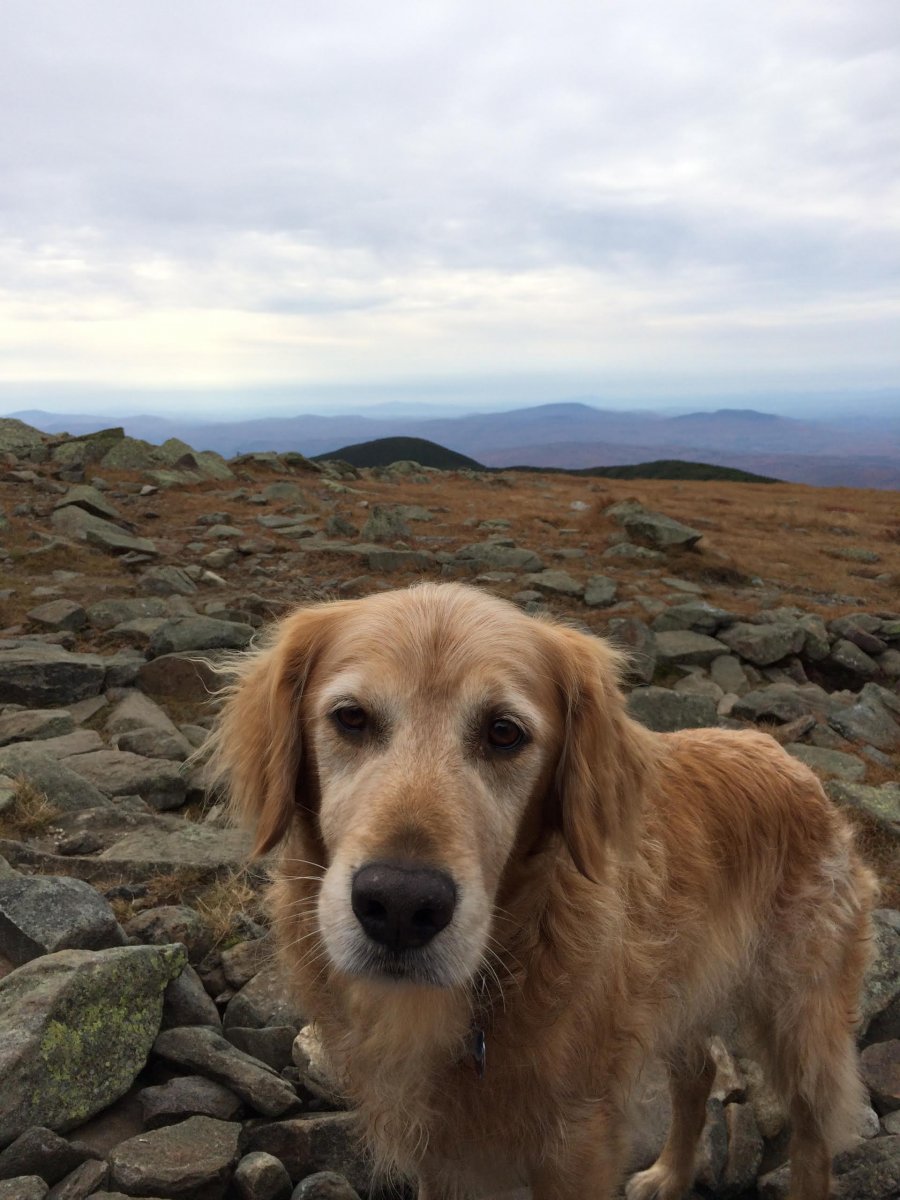Elissa Ely’s dog, Cooper, on Moosilauke

A small white envelope hand-addressed to me appeared in the pile of bills and junk mail a few years ago. I opened it up and found a flowered card. It was from Dr. Elissa Ely, a Boston psychiatrist and writer. She has recorded and written personal essays for public radio and print for years. Ely notices moods and fears everywhere she goes. She is a master at the very-short essay form. She calls her work “little pieces” but they leave big impressions.
That letter led to a correspondence. She wanted to write for Appalachia!
Elissa told me, “Especially in the huts, sleeping cheek to jowl with strangers, we’re drawn intensely into lives without knowledge or names.” I’ve found that mountains strip away pretense, perhaps not just in the way Elissa notices. (When I’m in the huts, I tend to withdraw. I don’t always notice the dramas there. I do notice tension, assumptions, nervousness, relaxation, and pure joy in people I meet up on the open rocks.)
The new issue of Appalachia, published this month, carries Ely’s second in a series of four vignettes of mountain encounters. It’s called, “Rehabilitation with Cooper: Deep in the mountains, a twice-homeless dog leaps straight to the heart of human contact.”
It starts off this way:
When we adopted my dog, Cooper, I doubted he would last. He was chaotic, agitated, full of anxious discharge without focus. According to records, his first owner was an elderly woman—I picture a crocheted blanket in a basket where he slept—who died when he was a puppy. The next was a young family. Here I picture a chain and a grassless yard, with no evil intentions, but with too many other children to remember the dog. After about a year, they turned him over to the rescue league, with an advising note one child had written: “Cooper is a good dog,” (in block letters), “but with Cooper, you must be very, very FRIM.”
I walked him miles and miles for months because he couldn’t be calmed. It was like rocking a baby with colic, trying to bring relief to mysterious pain. His only certainty was an unstable past. All the time we were walking, I dreaded the likelihood that he would need another placement; it would break him. Strangers passing us on the street nodded without hostility, interest, or warmth. That’s a city for you. But slowly, it began to dawn on him that the house he continued to return to was home. What he couldn’t know was what I’d decided. Our family would not be FRIM.
Then I took him to the mountains.
For the rest, see our new issue.
—
Her first tells about a couple who broke up inside one of the White Mountain high-country huts, just below the summit of Mount Lafayette. Here, below, is the full text of that vignette, which appeared in Winter/Spring 2015.
Heavy-limbed and middle-aged, we hiked up Old Bridle Path and over Agony Ridge, heading toward Greenleaf Hut, liberated from the human ties we had left behind. We felt ourselves agile and untethered. Without attachments to spouses and children, we had become downright buoyant.
On the second Agony, we slipped over rained-on rocks. We paused, took stock, took hold of wet boulders, and paused again. We were feeling more endangered now. A young Greenleaf Hut croo member passed in the other direction. She saw us hesitating and nodded, lightly skimming the rocks, but did not stop. She, too, was unattached.
Someone breathed behind us, and an old man, hale in a bandana, fell into step. He looked as though he could have blown up a balloon while vaulting past us. When he slowed down, it was not because he needed to; it was that we were new neighbors, and he had stopped to socialize over the fence. He said he hoped he could finish the entire Franconia Ridge loop and looked at his watch. “Feels good,” he said. The day was beautiful, the route straightforward.
But, our neighbor added, he had to move quickly. He had promised his wife he would be back before she became too worried. They had been married for 40 years. she didn’t like hiking; she liked shopping. She was going to find an outlet store or two, and would be waiting for him in the Lafayette Campground parking lot. They had parted an hour and a half ago, and he figured he had about three hours left before he needed to get back to her. He wondered whether he could finish the loop in that time. He thought probably not—which was disappointing, of course, but you had to be realistic. He would climb to the summit and turn around.
That was the marital bargain: all the mountain freedom he wanted, if he could keep his wife from worrying about him.
His solitary hike fulfilled him; we could see that. At the same time, it was obvious, he could hardly wait to return to his wife. He excused himself and sped up. Time talking to us meant distance lost. Thousands of feet below, an elderly woman would be waiting in a car with shopping bags. Maybe she was reading a paperback in the passenger seat. Maybe she had brought her knitting. Maybe she was gazing out the open window, remembering something they needed to do together.
That night, cheek to jowl with strangers, we lay in adjoining top tiers of triple bunk beds. A young man had spread his sheet in the bunk beneath one of us, and a young woman lay in the bunk beneath him. They spoke quietly to each other, in French. He kept peering over the edge to check on her. she lay curled under her sheet as if she had a chill. once or twice, he climbed out of his bed and knelt next to hers. They seemed affectionate, though she also seemed ill. We wondered what emergency procedures might be necessary if her fever—it must have been a fever—didn’t go down.
The next morning, he rose for breakfast, but she didn’t. She lay under her sheet while we dressed with our backs to them. she lay there while he folded his blankets and filled his backpack, went to the dining hall, finished his meal a table away from us, and returned to the bunks with a last cup of coffee. He knelt by her bed and said something, which we didn’t hear. Then he took up his poles, pulled his belongings onto his back, and left. A few minutes later, we realized he had hiked out. Another few, and we knew he wasn’t returning. she lay in the bunk, weeping. This was not for our eyes; it’s wrong to witness the shattering of a stranger. We had no right to this intimacy at 4,220 feet, yet could not avoid it. We looked past her for the toothpaste.
Then we climbed the mile to Mount Lafayette, stood in what seemed— to our aging bones—like a gale, and turned onto the foggy ridge. We stumbled down the Falling Waters Trail. Near the bottom, we encountered a couple hiking up the Falling Waters Trail, nowhere near the ridge, and even farther from the top of Lafayette and the trail down to Greenleaf Hut. They asked hopefully how much farther it was to Greenleaf Hut. We wondered whether they would find our stranger still there, crying.
We had taken to the mountains for a high view of our sorrows and for the freedom it brought. Elevation doesn’t diminish sorrows, and freedom is only a joy if you choose it. Late that night, driving in silence back to Boston and tethered again to responsibilities, we separately and secretly rejoiced— because, in fact, human ties are everything.
—
I am lucky. Elissa Ely bought a small card and wrote me a note saying she had read and thought about something I had written, a column about why I hike alone. (It is called “Really Going Over the Mountain,” and it was published in the Winter/Spring 2013 issue of Appalachia.
The result was this series of mountain stories. I had admired her writing in the Boston Globe and her essays on public radio for a few decades. And now she had written what amounted to a fan letter about something I had written.
